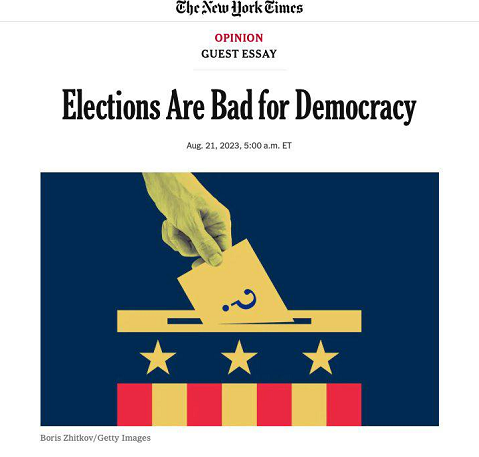


After all the caterwauling about our sacred elections and their importance to Our Democracy since November of 2020, I was surprised to see the graphic above show up on Twitter (or X). But Steven Hayward found more: NY TIMES LETS THE MASK SLIP
The late Tom Bethell used to point out in his American Spectator columns how denizens of Washington DC -- people we now regard as the shock troops of the administrative state -- regarded elections as a nuisance, because the results could interfere with their plans to extend expert control over everyone and everything, especially if those icky Republicans won (though usually not for long). Well, the New York Times has sort of come around the this position . . .
They thought better of this headline, apparently because it was too candid about the progressive view that the people--the ones who live south of Richmond anyway--are unfit actually to govern themselves. Within a few hours the Times changed it as follows:
See Hayward's post for the full graphics and a link to the NYT piece.
The gist of the article is that the wrong people run and are elected to office. The proposed remedy? Choose our government officials by lottery! Gee -- why didn't some ancient writer not think of that? Like, maybe Aristotle, in The Politics, Book IV, 1294be.
Does that mean we would be able to replace members of the Deep State by lottery periodically, too?
On the other hand, it is nice to see the Times start to come around to William F. Buckley Jrs point view that he'd rather be governed by the first 2000 names in the Boston telephone directory than the faculty of Harvard. . .
Hayward goes on to make a marvelous corollary point about education.
Coincidentally, a "friend of a friend" on social media (of a progressive persuasion) saw that I had posted the first NYT graphic. He paraphrased WFB to leave out the part about the Harvard faculty and suggest that the quote was about members of Congress. So I happen to have what WFB wrote about this point (though this was not the first time he had made the point about the Boston phone book and the Harvard faculty):
I am obliged to confess that I should sooner live in a society governed by the first two thousand names in the Boston telephone directory than in a society governed by the two thousand faculty members of Harvard University. Not, heaven knows, because I hold lightly the brainpower or knowledge or generosity or even the affability of the Harvard faculty: but because I greatly fear intellectual arrogance, and that is a distinguishing characteristic of the university which refuses to accept any common premise.
He wrote this in 1963 in Rumbles Left and Right: A Book about Troublesome People and Ideas. I'm not sure what Buckley meant by "any common premise", but I'm afraid that since 1963, the Harvard Faculty has become quite capable of accepting some really stupid ideas in common with each other.
Do we vote too much?
Meanwhile, The Atlantic suggests that we vote too much. In contrast to the NYT piece, its focus was on local measures, ballot initiatives, recalls, etc. In the "nature abhors a vacuum" category, homeowners associations were mentioned.
Americas voting problem is primarily a local one. When compared with that of peer nations, our general-election turnout is actually middle-of-the-pack. And although more voting at the federal level is desirable, some political-science research casts doubt on whether the results of national elections would significantly change if everybody showed up. Not so in local elections, where the electorate is remarkably unrepresentative.
The timing of the graphic to coincide with the first GOP debate, along with the one from the NYT suggesting that elections are "bad for democracy", is sort of disconcerting. And I'm not so sure that the intense focus on presidential politics leaves much room for the study of local politics even if local elections are scheduled along with federal elections.
What do you think about timing of local elections? I, and others here, have suggested that maybe we need to focus more of our attention locally. How do we do that? Of course, The Atlantic doesn't want too many conservatives and Senior Citizens showing up to vote on local issues.
Beyond the Headlines
Caught this quote from Walter Kirn today. It reminded me of the NYT changing their headline. Along with the surprises and dramatics that accompanied the debates and the arrest of Trump:
I strongly suggest that those wishing to make sense of current events ignore the headlines and delve into studies of mythology, ancient religion, psychoanalysis, and classic lit. We have left the mundane sphere of "politics" and are in a vaster, deeper, more symbolic domain.
He got some interesting responses. Check out others at the link. Here are a few:
The modern technocratic managerial mindset we've cultivated for ourselves seems to ignore every human tendency that can't be turned into data. Now all those pesky unmeasurables of heart, spirit, & mind are gathering strength & morphing into new & monstrous forms in the shadows.
Sir, one alternative might be to systematically study what causes social/political collapses.
Peter Turchin's book, End Times, summarizes the findings based on hard data going back centuries.
I'd like to respectfully suggest adding watching The Three Stooges to you list.
Perhaps we had better start fighting fire with fire
Loose Ends
From Steven Hayward again. Russia, San Francisco, Yale. Will these things ever make sense?
You just knew somebody would do this:
MAKE IT MAKE SENSE
Music
In the Hall of the Mountain King
Hope you have something nice planned for this weekend.
This is the Thread before the Gardening Thread.
Last week's thread, August 19, Any Fascists North of Richmond?
Comments are closed so you won't ban yourself by trying to comment on a week-old thread. But don't try it anyway.
